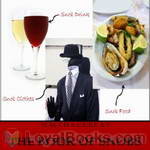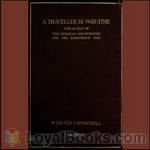|
Books Should Be Free Loyal Books Free Public Domain Audiobooks & eBook Downloads |
|
|
Books Should Be Free Loyal Books Free Public Domain Audiobooks & eBook Downloads |
|
Non-fiction |
|---|
|
Book type:
Sort by:
View by:
|
By: William Hillary (1771-1847) | |
|---|---|
 An Appeal to the British Nation on the Humanity and Policy of Forming a National Institution for the Preservation of Lives and Property from Shipwreck (1825)
An Appeal to the British Nation on the Humanity and Policy of Forming a National Institution for the Preservation of Lives and Property from Shipwreck (1825)
| |
By: William J. Claxton | |
|---|---|
 The Mastery of the Air
The Mastery of the Air
| |
By: William James (1842-1910) | |
|---|---|
 Essays in Radical Empiricism
Essays in Radical Empiricism
William James (1842 – 1910) was a pioneering American psychologist and philosopher. He wrote influential books on the young science of psychology, educational psychology, psychology of religious experience and mysticism, and the philosophies of pragmatism and Radical Empiricism. Essays in Radical Empiricism is a collection edited and published posthumously by his colleague and biographer Ralph Barton Perry in 1912. It was assembled from a collection of reprinted journal articles published from 1904–1905 which James had deposited in August 1906 at Harvard University, for supplemental use by his students. | |
 Varieties of Religious Experience
Varieties of Religious Experience
The Varieties of Religious Experience: A Study in Human Nature is a book by the Harvard psychologist and philosopher William James that comprises his edited Gifford Lectures on "Natural Theology" delivered at the University of Edinburgh in Scotland between 1901 and 1902. These lectures concerned the nature of religion and the neglect of science, in James' view, in the academic study of religion. Soon after its publication, the book found its way into the canon of psychology and philosophy, and has remained in print for over a century. | |
 Pragmatism
Pragmatism
'Pragmatism' contains a series of public lectures held by William James in Boston 1906–7. James provides a popularizing outline of his view of philosophical pragmatism while making highly rhetorical and entertaining lashes towards rationalism and other competing schools of thought. James is especially concerned with the pragmatic view of truth. True beliefs should be defined as, according to James, beliefs that can successfully assist people in their everday life. This is claimed to not be relativism... | |
By: William Kitchiner (1775?-1827) | |
|---|---|
 The Cook's Oracle; and Housekeeper's Manual
The Cook's Oracle; and Housekeeper's Manual
| |
By: William Lloyd Garrison (1805-1879) | |
|---|---|
 The Abolition Of Slavery The Right Of The Government Under The War Power
The Abolition Of Slavery The Right Of The Government Under The War Power
| |
By: William Makepeace Thackeray (1811-1863) | |
|---|---|
 The Book of Snobs
The Book of Snobs
The necessity of a work on Snobs, demonstrated from History, and proved by felicitous illustrations:—I am the individual destined to write that work—My vocation is announced in terms of great eloquence—I show that the world has been gradually preparing itself for the WORK and the MAN—Snobs are to be studied like other objects of Natural Science, and are a part of the Beautiful (with a large B). They pervade all classes—Affecting instance of Colonel Snobley. | |
By: William McCombie (1805-1880) | |
|---|---|
 Cattle and Cattle-breeders
Cattle and Cattle-breeders
| |
By: William Morris (1834-1896) | |
|---|---|
 Signs of Change
Signs of Change
In the 1880s William Morris, the artist and poet famously associated with the Arts and Crafts movement, left the Liberal Party and threw himself into the Socialist cause. He spoke all over the country, on street corners as well as in working men's clubs and lecture halls, and edited and wrote for the Socialist League's monthly newspaper. Signs of Change is a short collection of his talks and writings in this period, first published in 1888, covering such topics as what socialism and work should be, and how capitalism and waste developed. | |
By: William N. Brown | |
|---|---|
 Handbook on Japanning: 2nd Edition For Ironware, Tinware, Wood, Etc. With Sections on Tinplating and Galvanizing
Handbook on Japanning: 2nd Edition For Ironware, Tinware, Wood, Etc. With Sections on Tinplating and Galvanizing
| |
By: William Nelson Taft | |
|---|---|
 On Secret Service
On Secret Service
Detective-Mystery stories based on real cases solved by government agents. Created initially in 1865, the U.S. Secret Service continued to expand over the years, particularly following the assassination of President McKinley in 1901. The episodes in this compilation are comprised of authentic stories, dramatized, while remaining true to the actual incidences. - Summary by Roger Melin | |
By: William R. Lighton (1866-1923) | |
|---|---|
 Lewis and Clark: Meriwether Lewis and William Clark
Lewis and Clark: Meriwether Lewis and William Clark
Meriwether Lewis and William Clark – In the years 1804, 1805, and 1806, two men commanded an expedition which explored the wilderness that stretched from the mouth of the Missouri River to where the Columbia enters the Pacific, and dedicated to civilization a new empire. Their names were Meriwether Lewis and William Clark. This book relates that adventure from it’s inception through it’s completion as well as the effect the expedition had upon the history of the United States. | |
By: William Sangster (1808-1888) | |
|---|---|
 Umbrellas and Their History
Umbrellas and Their History
A whimsically serious look at the umbrella and society. | |
By: William Saunders (1822-1900) | |
|---|---|
 Catalogue of Economic Plants in the Collection of the U. S. Department of Agriculture
Catalogue of Economic Plants in the Collection of the U. S. Department of Agriculture
| |
By: William Senior (1839?-1920) | |
|---|---|
 Lines in Pleasant Places Being the Aftermath of an Old Angler
Lines in Pleasant Places Being the Aftermath of an Old Angler
| |
 Scotch Loch-Fishing
Scotch Loch-Fishing
| |
By: William Strunk Jr. | |
|---|---|
 The Elements of Style
The Elements of Style
The Elements of Style (1918) by William Strunk, Jr. is an American English writing style guide. It is one of the best-known and most influential prescriptive treatment of English grammar and usage, and often is required reading in U.S. high school and university composition classes. The original 1918 edition of The Elements of Style detailed eight elementary rules of usage, ten elementary principles of composition, “a few matters of form”, and a list of commonly "misused" words and expressions... | |
By: William T. Hornaday (1854-1937) | |
|---|---|
 Our Vanishing Wild Life
Our Vanishing Wild Life
We are weary of witnessing the greed, selfishness and cruelty of “civilized” man toward the wild creatures of the earth. We are sick of tales of slaughter and pictures of carnage. It is time for a sweeping Reformation; and that is precisely what we now demand. -William Temple Hornaday | |
By: William T. Preyer (1841-1897) | |
|---|---|
 The Mind of the Child, Part II The Development of the Intellect, International Education Series Edited By William T. Harris, Volume IX.
The Mind of the Child, Part II The Development of the Intellect, International Education Series Edited By William T. Harris, Volume IX.
| |
By: William Tecumseh Sherman (1820-1891) | |
|---|---|
 Sherman’s Recollections of California, 1846-1848, 1855-1857, from his Memoirs
Sherman’s Recollections of California, 1846-1848, 1855-1857, from his Memoirs
This librivox recording comprises three chapters from American Civil War General William Tecumseh Sherman’s Memoirs. The chapters deal with a posting to California in his pre-Civil War military career in the years 1846-1848. While many of his colleagues saw action in the Mexican-American War, Sherman performed administrative duties in the captured territory of California. Along with fellow Lieutenants Henry Halleck and Edward Ord, Sherman embarked from New York on the 198-day journey around Cape Horn aboard the converted sloop USS Lexington... | |
By: William Walker Atkinson (1862-1932) | |
|---|---|
 Hindu-Yogi Science Of Breath
Hindu-Yogi Science Of Breath
Increase your awareness about the forgotten art of breathing as researched, practiced and written by our Eastern brothers. Inside you will find how our Western society has perhaps forgotten the proper way to breath, hence leaving us more susceptible to disease and poor health. This book explains in layman's terms what happens inside our bodies when we inhale and then exhale. And the effects improper breathing has on both our internal and external extremities. It describes nature's proximity for the respiratory, and circulatory systems. The final sections include invaluable Yogi breathing exercises for increased breathing awareness and better health. Salaam. (Mike Justice) | |
By: William Wells Brown (1814?-1884) | |
|---|---|
 Three Years In Europe
Three Years In Europe
William Wells Brown was born a slave, near Lexington, Kentucky. His mother, Elizabeth, was a slave--his father a white man who never acknowledged his paternity. Brown escaped slavery at about the age of 20. For many years he worked as a steamboatman and as a conductor for the Underground Railroad in Buffalo, New York. In 1843, he became a lecturer for the Western New York Anti-Slavery Society, and was a contemporary of Frederick Douglass.Brown went to Europe in 1849 to encourage British support for the anti-slavery movement in the United States... | |
By: William Westgarth (1815-1889) | |
|---|---|
 Personal Recollections of Early Melbourne and Victoria
Personal Recollections of Early Melbourne and Victoria
Son of John Westgarth, surveyor-general of customs for Scotland, was born at Edinburgh, in June 1815. He was educated at the high schools at Leith and Edinburgh, and at Dr Bruce’s school at Newcastle-on-Tyne. He then entered the office of G. Young and Company of Leith, who were engaged in the Australian trade, and realizing the possibilities of the new land, decided to emigrate to Australia. He arrived in Melbourne, then a town of three or four thousand inhabitants, in December 1840.When the new colony was constituted Westgarth headed the poll for Melbourne at the election for the legislative council... | |
By: William Worthington Fowler (1833-1881) | |
|---|---|
 Woman on the American Frontier
Woman on the American Frontier
Many books describe the role of men during American history. However, at the same time, women did much: comforted, fought, helped, raised children, and much more. This book is full of mini-biographies of women in many places, and many ages- each chapter telling about a different subject. | |
By: Willis J. Abbot (1863-1934) | |
|---|---|
 Aircraft and Submarines
Aircraft and Submarines
"Aircraft and Submarines" is a history of the development of these forms of transportation and their ultimate use in warfare. Also a brief history of submarine use in commercial applications. A thoroughly enjoyable piece for anyone interested in the detailed development of these modes of transportation. | |
 American Merchant Ships and Sailors
American Merchant Ships and Sailors
| |
 The Naval History of the United States Volume 1
The Naval History of the United States Volume 1
| |
By: Winston Churchill (1874-1965) | |
|---|---|
 The River War: An Account of the Reconquest of the Sudan
The River War: An Account of the Reconquest of the Sudan
When the self-proclaimed Mahdi (“Guided One”) gathered Islamic forces and kicked the Anglo-Egyptians out of the Sudan, he unleashed a backlash. With the image of the heroic General Charles Gordon dying at Khartoum, the British public was ready to support a war to reclaim the lost territories. And when the political time was right, a British-Egyptian-Sudanese expedition led by the redoubtable Herbert Kitchener set out to do just that.The river involved was the Nile. For millennia, its annual flood has made habitable a slender strip, though hundreds of miles of deserts, between its tributaries and its delta... | |
 A Traveller in War-Time
A Traveller in War-Time
This is a collection of a series of journalistic articles written during his travels throughout WWI era Europe that Churchill — the American author, not the famed British statesman — published in 1917; the book version came out in 1918. The writing is sharp, straightforward, and rarely sentimental, with loads of local color and occasional humor. | |
By: Woman's Institute of Domestic Arts and Sciences | |
|---|---|
 Woman's Institute Library of Cookery Volume 1: Essentials of Cookery; Cereals; Bread; Hot Breads
Woman's Institute Library of Cookery Volume 1: Essentials of Cookery; Cereals; Bread; Hot Breads
| |